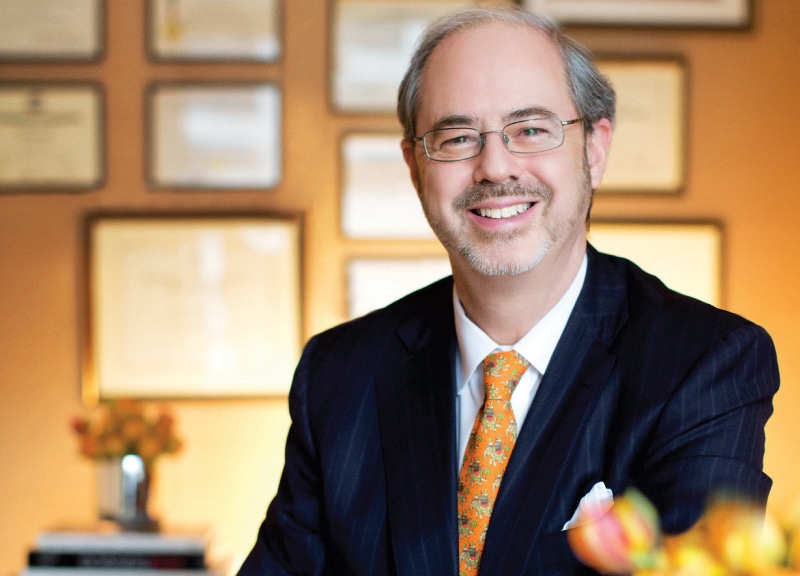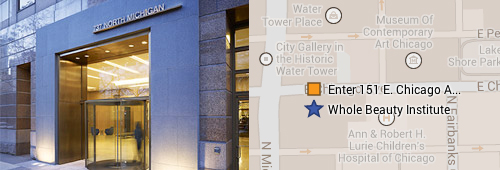Education and Credentials

Awards and Recognition

REAL PATIENT RESULTS
See the difference experience makes. View the full before & after photo gallery of Dr. Cook and his team.
10 Questions to Ask Before Undergoing Facial Surgery
Be Selective When Choosing a Surgeon in Winnetka, Chicago, or Elsewhere
I hope that if you are considering facial rejuvenation surgery, you will read this page in the education section carefully. I have put together a set of facial plastic surgery questions that will help you select a surgeon who is not only competent, but also passionate about his work.
1) What Are Your Credentials?
This is the first question, since it provides the foundation on which the surgeon’s identity rests. One wonderful aspect of the Internet is that it enables you to obtain this information without having to visit each doctor’s office. I would advise you to eliminate from consideration any plastic surgeon who does not demonstrate a consistent pattern of reaching for excellence in all aspects of his education and professional career. You should look at every possible credential, including college, medical school, residency, and current hospital affiliation. These should not be merely adequate, but excellent. After all, it’s your face that will be in this person’s hands.
There are no shortcuts to excellence. Doctors who are certified by the American Board of Plastic Surgery, for example, have gone through anywhere from five to eight years of advanced training after medical school. After training is complete, they are subjected to two rigorous examinations and a screening for ethics in their practice. This certainly provides an excellent foundation from which a surgeon can eventually develop into a leader in the field of facial rejuvenation surgery.
2) What Is Your Level of Experience?
I believe that there are many similarities in the career paths of leading classical musicians and leading plastic surgeons. Both fields require significant personal sacrifice in the pursuit of one’s art. Basic mastery of the instrument requires well over a decade of intense study and practice; virtuosity occurs as one acquires wisdom and nuance over a lifetime. For the plastic surgeon who is truly interested in mastering the field, there is no endpoint. The process of visual and technical refinement never ends. Each patient adds to the mental database of facial structure and form. What I am suggesting is this: The more experience, the better. One might raise the objection that it is possible to do the same thing 1,000 times and not do it well, but the other questions in this list should eliminate surgeons who are not serious about their craft. At a minimum, you should look for a surgeon who has done more than 250 facelifts and has been in practice the better part of 10 years.
3) What Are You Trying to Achieve When You Rejuvenate a Face?
This question gives you a window into a surgeon’s thought processes and visual aesthetic. If a surgeon cannot offer you a clear concept of what facial rejuvenation surgery is about, keep looking for another surgeon. It is impossible to accomplish anything of significance without a clear concept of one’s goals.
This question should also help to prevent a mismatch between the doctor’s and the patient’s personal aesthetic. There are surgeons who consistently and safely produce results for their patients that I consider hollow and distorted. Their patients may very well be pleased with these results! My patients and I definitely would not want to achieve this outcome. The point is to make sure your concept of facial aesthetics matches that of your surgeon before you undergo surgery.
4) How Do You Refine Your Artistic Concept of Facial Beauty?
This question may seem a bit esoteric, but it is not. Aesthetic plastic surgery in all its forms—facial aesthetic surgery, in particular—is a type of artistic expression. As such, it requires lifelong refinement. Our patients trust their faces to us, and this is a great privilege. I know many excellent plastic surgeons who perform facial rejuvenation surgery, and every one of them could answer this question without a moment’s hesitation. For each one, the answer will be a little different, but in every case it will reveal a respect for the artistic basis of plastic surgery. The reason I place emphasis on this question is that it might help you unmask a doctor who has devoted so much energy to the marketing of his practice that he has neglected his underlying craft.
5) How Will You Address Issues of Facial Volume?
Thank goodness our understanding of the facelift has evolved substantially from the days when it was all about pulling back on the skin. Most leaders in the field of facial rejuvenation surgery now realize that the key to success is the repositioning of the deeper structures of the face and neck. There are different technical solutions for this, but in my opinion, all of the truly effective techniques address this issue. For most patients, structural repositioning alone will not restore what is pleasing about an attractive, youthful face.
A second issue that must be addressed is the volumetric changes that occur with facial aging. The upper cheek, in particular, becomes sunken and visually fragmented, with disturbing shadows that were not previously there. Surgeons who try to compensate for volume loss by over-pulling the facelift produce the distorted masks that can give the operation a bad name. The issue of volumetric rejuvenation of the face has fascinated me for more than 20 years. Alone or in combination with structural repositioning, volume restoration has provided a key missing link in our repertoire. If you are looking to achieve a higher-level result from facial rejuvenation, you will benefit from a surgeon who has significant experience with restoring facial volume.
6) How Will You Preserve My Facial Identity?
Our ability to recognize faces is complex and nuanced. How do we know that the woman walking toward us is our best friend and not merely someone who looks like her? Apart from basic issues such as facial shape, hair color, and eye color, there are cues provided by the position of key facial landmarks. These landmarks include the position of the hairline and sideburn, the contour and orientation of the ear, and the position of the eyes. There are also nuances of motion—the way we smile, for example—that immediately inform the world of our identity. The avoidance of distortion of these reference points and motions requires a carefully thought out plan on the part of the surgeon that recognizes and preserves each face’s character. A prospective surgeon’s answer to this question will reveal how carefully he has thought about these issues and how much value he places on attention to detail. Each facial reference point can be protected with a specific technical solution. To ignore them does our patients a disservice.

If you would like to have a consultation for facial surgery, please call 312-751-2112 or contact us online.
Request a consult7) Where Will My Surgery Be Performed and Who Will Provide Anesthesia?
The setting where your surgery will be performed influences both the safety and the quality of your experience. Over the years, I have visited many colleagues and watched them operate at the highest standards in office surgical facilities, surgicenters, and hospitals. I am also aware of situations where standards of cleanliness and patient safety have been compromised. The challenge of this question is to obtain an answer that is meaningful to someone who is not “in the business” of delivering care to surgical patients. I submit that any experienced surgeon, anesthesiologist, or surgical nurse could spend five minutes in a surgical facility (office, surgicenter, or hospital) and obtain an accurate impression of its quality.
Here are some suggestions to provide you with an “insider’s” insight. If the surgery is to occur in the physician’s office, you should ask to see the area where your surgery will be performed. Does it look like an operating room, or does it appear to be an afterthought? What are the credentials of the people who will be assisting the doctor during the surgery? Of course, they should either be registered nurses or certified surgical technologists. I have heard of office-based facilities where receptionists double as surgical assistants during office surgical procedures. These people simply do not have the proper training to maintain sterile technique. Any office-based facility that is aboveboard will be proud to present you with a list of the specific individuals who work in the surgical area and their credentials. If you encounter any hesitation in the response, I would consider this a major warning sign. If a surgery is to be performed in a surgicenter or an office facility, make certain that the doctor has privileges to perform the surgery at an accredited hospital. This is one further indication that the surgeon is not operating away from the hospital to hide the fact that he does not have adequate credentials.
If the procedure you are considering involves general or intravenous sedation anesthesia, you should insist that the facility has proper accreditation. The Joint Commission on the Accreditation of Healthcare Organizations (JCAHO) is the main organization that accredits hospitals in this country. It also has separate programs for the accreditation of surgicenters and office surgical facilities. There are other organizations with long abbreviations, such as AAAAPSF and AAAASF, whose prime emphasis is the accreditation of ambulatory surgical facilities.
I would also suggest that your interests will be better served if there is a dedicated individual whose sole responsibility is to provide your anesthesia. This issue comes up most frequently when IV sedation anesthesia is given. The ideal, in my opinion, is for an anesthesiologist or nurse anesthetist to be present through the entire course of your surgery. There are some surgeons who will attempt to be both surgeon and anesthetist; in other words, they will instruct someone else in the room to inject medications into the intravenous line to make the patient sleepy. The problem is that different patients have different sensitivities to intravenous agents; a dose that might make one person a little sleepy might take another person into a plane that approaches general anesthesia. How a surgeon is able to concentrate on the surgery and monitor his patient’s anesthesia is beyond me. Make sure you ask the question, “Who will monitor my anesthesia?” whether your procedure is in an office, a surgicenter, or a hospital.
If your surgery is to be performed in a hospital or a surgicenter, insist on a facility that attracts the leading surgeons in your community. The same qualities that make a physician a leader in his or her field will compel that physician to find the best and safest facility for his or her patients. From a patient’s perspective, the determination of quality is most easily made with hospitals. Look for hospitals that have an acknowledged position of leadership in your community. With surgicenters, one way to get a sense of quality is to look at the hospital affiliations of the doctors that use the facility. If a majority of the surgeons who operate at a facility are on the staff of leading hospitals in your area, this is one of the best indicators that the standards will be high.
8) Do You Do All of Your Own Work?
The plastic surgeon is essentially an artisan, a highly skilled craftsman who fashions beautiful, finely worked creations out of his patients’ faces. The plastic surgeon is well compensated for his or her work, but there is a practical limit to how much work he or she can do without a deterioration of quality. Unfortunately, we live in an era of overconsumption, where greed is the driving force for a number of people. With greed in the driver’s seat, there is always someone whose trust ends up being betrayed. In the last few years, we have witnessed many examples of betrayal of trust by various figures in politics, corporate management, and in the financial markets. Physicians, unfortunately, are not immune from this trend. There are two temptations that present themselves to the plastic surgeon who succumbs to the greed mechanism.
The first temptation is to rush through his work; this increases his output at the expense of the quality of his work. Whether a surgeon succumbs to this temptation or not is a question of character.
The second temptation is to employ “ghost surgeons.” This enables the surgeon to carry out several operations at once, but at a sacrifice of quality and honesty. If you have accurately researched the other questions in this list, you will probably avoid the problem of “ghost surgery.” The reason for this is that people who employ “ghost surgeons” tend to be cheaters. The surgeon who has shown respect for his craft by investing years in proper training at the highest levels and has developed his own approach by years of careful refinement possesses the type of character that would be uncomfortable cheating his patients. Even if all other credentials are in order, it never hurts to ask this question— not only of the surgeon, but also of his or her staff. A hesitant response or confusing body language might indicate that there is a potential problem.
9) Who Is Your Employer?
This might seem an odd question, but it is actually quite important. The quality of an organization is determined by its leader. Is this an organization that always puts the patient’s interest first, or is it all about making money fast? The principled surgeon who mistakenly joins an organization with faulty principles will eventually face a moment of decision: Either he lowers his personal standards to that of the organization, or he quits. There are various business entities that have decided to enter the field of cosmetic surgery. Sometimes these are businessmen with no medical background; sometimes these are the surgicenters themselves. These organizations hire surgeons, often with very little experience, to be their “plastic surgeons.” They employ aggressive marketing techniques, which include direct phone solicitation and deceptive advertising to generate business.
Frequently, the marketing centers on a magic procedure with no scars and no recovery time. As you might expect, these organizations experience a high level of physician turnover, since the entire emphasis is on sales rather than service to the patient. Physicians who work for such organizations may be penalized if they turn down a patient who is not a good candidate for surgery, since this is simply viewed as a lost opportunity to make money. It is always the owner of the business who calls the shots and sets the standards. If you were to encounter a surgeon with reasonable credentials who works for someone with dubious credentials, you might seriously consider looking elsewhere.
10) What Is the Feel of This Place?
This is a question you should ask yourself after you have completed your visit to the doctor’s office. Consider the quality of interaction with the doctor and his staff. Are these people you can count on to help you through the recovery from surgery, or will they abandon you once the procedure is over? Does the emphasis seem to be on caring for you, or is it on the hard sell? Are these people you would feel comfortable taking care of your best friend? Trust your instincts. Care and compassion cannot be faked. Almost every patient who comes to see me after a disappointing experience with another surgeon tells me, “Something told me it just wasn’t right.” Remember that this is elective surgery. There are no emergency facelifts! That provides you with the freedom to keep looking until you find the doctor and team that are right for you.

If you would like to have a consultation for facial surgery, please call 312-751-2112 or contact us online.
Request a consultFacial Surgery Education
Facial Plastic Surgery: 10 Questions
Face Lift Surgery: 10 Facts
Blepharoplasty: 10 Facts
Dr. John Cook Shares His Facelift Techniques on a National Level
Facelift patients may not want to broadcast to the world that they’ve had work done, but as a plastic surgeon providing facelift procedures at the Chicago area’s Whole Beauty® Institute, Dr. John Q. Cook wants as many people as possible to know about the procedure....

Facelift Recovery – What You Need to Know
Dr. Cook discuss the phases of facelift recovery, what to do prior in preparation for your surgery, and common questions patients ask regarding the recovery and results from facelift surgery.

Can You Have a Facelift with Just Local Anesthesia?
Sagging skin on the face is linked to a loss of facial fat, along with damage or loss to the collagen and elastin fibers that provide support for the skin. As we age, it’s common to develop a gaunt or sunken appearance in the cheeks and temples, while skin may begin...
Dr. Cook's Practice Blog
Explore our practice blog to learn more about non-surgical treatments and plastic surgery procedures available at The Whole Beauty® Institute. Get tips and advice, and discover new ways to improve your health and beauty.
Dr. Cook's HealthGems Blog
Dr. John Q. Cook shares his personal thoughts on well-being, quality of life, and more in HealthGems—from his decades of experience in the industry, studying and working with advanced technology and techniques.
Whole Beauty Skincare
SkinShopMD.com was created by Board-Certified plastic surgeon, Dr. John Q. Cook, as a trusted source for high quality, medical-grade skincare products to protect and rejuvenate your skin.

Educational Information
Get informed about cosmetic plastic surgery procedures and rejuvenating non-surgical treatments to help you make informed decisions about your desired treatment based on your aesthetic goals.
Testimonial and Practice Videos
Schedule a Consultation
Schedule a consultation with board-certified plastic surgeon, John Q. Cook, M.D., to learn more about plastic surgery solutions that may be right for you based on your aesthetic goals.
"*" indicates required fields
Our Office Locations
Our locations in the Gold Coast of Chicago and Winnetka in the North Shore reflect our commitment to convenient and discrete concierge-level service.
Chicago Office
737 North Michigan Ave., Suite 760 Chicago IL 60611 (312) 751-2112 Entrance at 151 E. Chicago Avenue
Winnetka Office
118 Green Bay Road Winnetka IL 60093 (847) 446-7562
Located directly across from Indian Hill Metra Station







